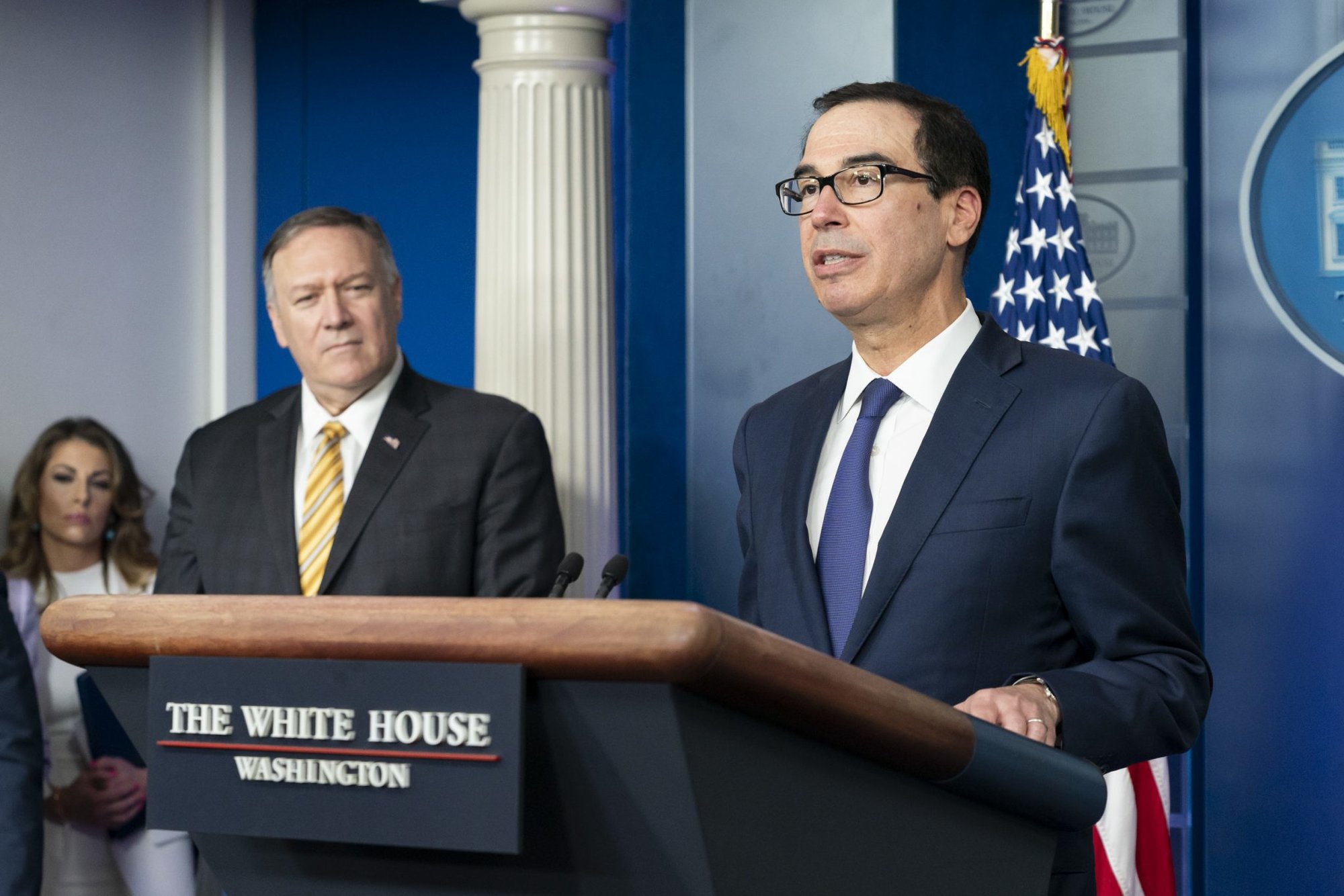
Secretary of State Mike Pompeo and Secretary of the Treasury Steven Mnuchin speak to reporters Tuesday, Sept. 10, 2019, in the James S. Brady Press Briefing Room of the White House. Official White House Photo by Andrea Hanks
This article was originally published on Oct. 8, 2020, on Radio Free Europe/Radio Liberty.
Washington has blacklisted virtually all of Iran’s financial sector, striking an economy already hit hard by U.S. sanctions.
The move on October 8 blacklists 18 Iranian banks that had, so far, escaped most of the U.S. sanctions reimposed by Donald Trump’s administration since the president pulled the United States out of a 2015 nuclear pact between Tehran and world powers.
Critically, the move subjects foreign, non-Iranian financial institutions to penalties for doing business with the blacklisted Iranian entities — effectively cutting off Iran from the international financial system.
“Today’s action to identify the financial sector and sanction eighteen major Iranian banks reflects our commitment to stop illicit access to U.S. dollars,” U.S. Treasury Secretary Steven Mnuchin said.
“Our sanctions programs will continue until Iran stops its support of terrorist activities and ends its nuclear programs,” Mnuchin said. “Today’s actions will continue to allow for humanitarian transactions to support the Iranian people.”
A Treasury Department statement said the action targets 16 Iranian banks for their role in the country’s financial sector. It says one bank was blacklisted because it is affiliated with Iran’s military and one for being owned or controlled by another sanctioned Iranian bank.
Some of the institutions had been covered by previous designations, but the move on October 8 places them all under the same authority covering Iran’s entire financial sector.
The targeted banks are the Amin Investment Bank, Bank Keshavarzi Iran, Bank Maskan, Bank Refah Kargaran, Bank-e Shahr, Eghtesad Novin Bank, Gharzolhasaneh Resalat Bank, Hekmat Iranian Bank, Iran Zamin Bank, Karafarin Bank, Khavarmianeh Bank, Mehr Iran Credit Union Bank, Pasargad Bank, Saman Bank, Sarmayeh Bank, Tosee Taavon Bank, Tourism Bank, and the Islamic Regional Cooperation Bank.
Foreign companies that do business with those banks were given 45 days to wind down their operations before facing so-called “secondary sanctions.”
Copyright (c)2020 RFE/RL, Inc. Reprinted with the permission of Radio Free Europe/Radio Liberty, 1201 Connecticut Ave NW, Ste 400, Washington DC 20036.

Coffee or Die is Black Rifle Coffee Company’s online lifestyle magazine. Launched in June 2018, the magazine covers a variety of topics that generally focus on the people, places, or things that are interesting, entertaining, or informative to America’s coffee drinkers — often going to dangerous or austere locations to report those stories.
BRCC and Bad Moon Print Press team up for an exclusive, limited-edition T-shirt design!
BRCC partners with Team Room Design for an exclusive T-shirt release!
Thirty Seconds Out has partnered with BRCC for an exclusive shirt design invoking the God of Winter.
Lucas O'Hara of Grizzly Forge has teamed up with BRCC for a badass, exclusive Shirt Club T-shirt design featuring his most popular knife and tiomahawk.
Coffee or Die sits down with one of the graphic designers behind Black Rifle Coffee's signature look and vibe.
Biden will award the Medal of Honor to a Vietnam War Army helicopter pilot who risked his life to save a reconnaissance team from almost certain death.
Ever wonder how much Jack Mandaville would f*ck sh*t up if he went back in time? The American Revolution didn't even see him coming.
A nearly 200-year-old West Point time capsule that at first appeared to yield little more than dust contains hidden treasure, the US Military Academy said.












